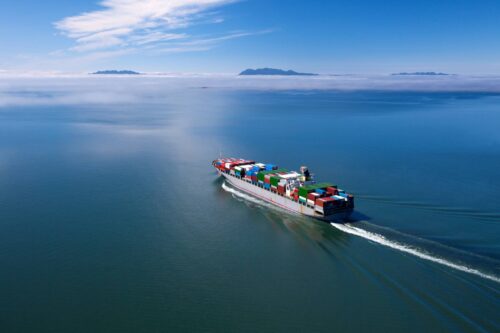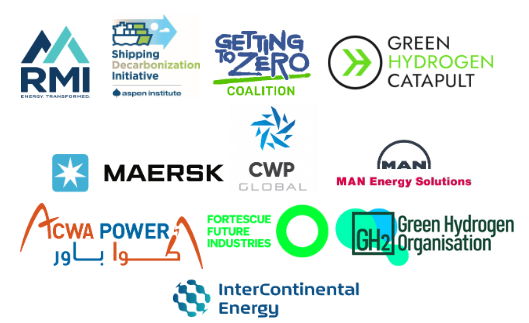
Maritime Sector and Green Hydrogen Leaders Agree on Ambitious Targets and Collaboration to Reach Zero-Emissions Global Shipping by 2050
Ten organizations signed the Joint Statement on Green Hydrogen and Green Shipping, committing to rapid adoption of green hydrogen-based fuels this decade to get on track for full decarbonization of the shipping sector by 2050, and calling on policymakers to help achieve the ambitious targets.
Sharm El-Sheikh, Egypt – November 14, 2022
Leading organizations and initiatives across the shipping value chain, joined by the largest producers of green hydrogen, today signed on to a joint statement at COP27, committing to the rapid and ambitious production and use of low-carbon fuels based on green hydrogen to accelerate decarbonization of global shipping. The shipping sector currently accounts for 3 percent of global greenhouse gas emissions but is expected to grow to 50 percent by 2050 without intervention.
The Joint Statement on Green Hydrogen and Green Shipping, facilitated by the UN Climate Change High-Level Champions and nonprofit RMI, was signed by representatives of the Aspen Shipping Decarbonization Initiative, the Getting to Zero Coalition, the Green Hydrogen Catapult, the Green Hydrogen Organization (GH2), ACWA Power, A.P. Moller – Maersk, CWP Global, Fortescue Future Industries, InterContinental Energy, and MAN Energy Solutions.
“Our path ahead is clear: shipping must transition away from fossil fuels and toward scalable zero-emissions fuels. Members of the Getting to Zero Coalition and other signatories to this joint statement stand firmly behind this goal and have already taken crucial first steps to make this happen. Commitments today show that there will be sufficient supply of green fuels and demand for zero-emissions shipping,” said Johannah Christensen, CEO of the Global Maritime Forum, founding partner of the Getting to Zero Coalition.
“We are energized by the momentum we see in the maritime and hydrogen sectors toward full industry decarbonization on a Paris-aligned timeline,” said Ingrid Irigoyen, director of the Aspen Institute’s Shipping Decarbonization Initiative, which facilitates Cargo Owners for Zero Emission Vessels (coZEV). “Climate-leading cargo owners want zero-emissions shipping to not only become available and competitive, but to become the new normal,” Irigoyen added.
By bringing suppliers and consumers of green hydrogen into agreement about the urgency of the technology’s adoption in shipping, the joint statement aims to build confidence for the deployment of low-emissions fuel at scale to unlock cost reductions and reduce investment risk.
“We are living in a climate emergency, and we need to rapidly accelerate the global availability of green fuels,” said Henriette H. Thygesen, CEO of Fleet and Strategic Brands at A.P. Moller – Maersk. “Access to green hydrogen is an important pathway to secure this important scale-up for the shipping industry as a whole and for us at A.P. Moller – Maersk to reach our 2040 net-zero target. Operating a large fleet of container vessels, we have made the choice to take an active part in shaping the solutions for the future together with partners. No one can do it alone.”
In the agreement, the signatories have agreed to pursue cross-sector collaboration to achieve:
- Commercially viable zero-emissions vessels operating on the deep seas by 2030
- Scaling up production of green hydrogen to 5.5 million tons per year by 2030 for use in shipping
- Full decarbonization of the shipping sector by 2050 at the latest
“This is a target that we can reach. In fact, achieving existing targets set by Green Hydrogen Catapult members alone would be enough to supply nearly 90 percent of the green hydrogen needed by the shipping sector by 2030,” said Oleksiy Tatarenko, senior principal at RMI and secretariat of the Green Hydrogen Catapult, a coalition of green hydrogen producers and first movers committed to mobilizing production and demand of the low-carbon energy source in this decade. “To make it happen we need, among other things, to triple down on planning for green shipping corridors as fuels are supplied in specific places.”
Alex Hewitt, CEO of global green hydrogen developer CWP Global and current chair of the Green Hydrogen Catapult, added: “This is a significant step forward for the green hydrogen and shipping industries. We are pleased to bring the heft and commitment of the Catapult companies to accelerate progress this decade toward zero-emissions shipping. The joint statement, as well as last week’s launch of the Green Shipping Challenge, which CWP participated in, are very good news for the planet.”
“More than anything, the world needs a massive amount of industrially scaled green hydrogen production to build momentum for the broad adoption of hydrogen as a maritime fuel,” said Uwe Lauber, CEO of MAN Energy Solutions. “Decarbonization of the marine industry is a mammoth undertaking but, I believe, eminently achievable through cooperation with like-minded industry partners. At MAN Energy Solutions, we believe that hydrogen has a key role to play in getting to net zero, and our recent, significant investment in our hydrogen subsidiary, H-TEC SYSTEMS, intends to quickly transform it into a mass-producer of PEM electrolyzers.”
The signatories called on international authorities and national governments to support private-sector commitments with correspondingly ambitious policy. The joint statement specifically asks the International Maritime Organization and member states to commit to a 100 percent emissions reduction for the maritime sector by 2050 with robust interim targets.
“The time for hesitation has long passed – every actor in this space has the opportunity to take bold action now, both individually and together, and this urgently includes policymakers at the IMO and domestically helping us de-risk this transition and create the conditions for success,” said Ingrid Irigoyen of the Aspen Shipping Decarbonization Initiative. “We and our fellow high-ambition partners are ready to do our part, but we know that global policy change is needed to create opportunities for zero-emissions fuels and technologies to thrive and quickly achieve scale.”
Johannah Christensen of the Getting to Zero Coalition added: “To take this further, we need fast and bold action by policymakers to develop an ambitious and supportive policy framework that accelerates this transition, without which the maritime industry alone cannot achieve full decarbonization by 2050.”
Media inquiries please contact:
Alexandra Wall, Strategic Communications Manager, RMI: awall@rmi.org
About RMI
Rocky Mountain Institute (RMI) is an independent, nonpartisan nonprofit founded in 1982 that transforms global energy systems through market-driven solutions to secure a prosperous, resilient, clean energy future for all. In collaboration with businesses, policymakers, funders, communities, and other partners, RMI drives investment to scale clean energy solutions, reduce energy waste, and boost access to affordable clean energy in ways that enhance security, strengthen the economy, and improve people’s livelihoods. RMI is active in over 60 countries. More information on RMI can be found at www.rmi.org or follow us on Twitter @RockyMtnInst.
About the Green Hydrogen Catapult
The Green Hydrogen Catapult is a global initiative convened with the support of the UN High Level Champions for Global Climate Action and hosted by RMI. It was founded and is led by a group of leading global industrials aiming to accelerate green hydrogen adoption at scale. Members include ACWA Power, ArcelorMittal, CWP Global, Fortescue Future Industries, H2 Green Steel, Mærsk Mc-Kinney Møller Center for Zero Carbon Shipping, Power-2-X, and Yara.
About the Aspen Shipping Decarbonization Initiative
The Aspen Institute Energy and Environment Program’s Shipping Decarbonization Initiative (SDI) is partnering with leading organizations and companies from around the world, tapping into a vast network to drive the transition to zero emission maritime shipping and decarbonize one of the most important sectors of the global economy. Aspen SDI is convening multinational cargo owners through Cargo Owners for Zero Emission Vessels (coZEV) to accelerate shipping decarbonization, elevating the need for shipping decarbonization within the U.S. policy context, and advancing the establishment of zero-emission transoceanic maritime transport corridors. A collaboration among climate-leading cargo owners to accelerate the transition to zero-emissions maritime shipping, coZEV includes 19 global brands that have set an ambition to only use zero-emissions ocean freight by 2040.
About the Getting to Zero Coalition
The Getting to Zero (GtZ) Coalition, a partnership between the Global Maritime Forum and World Economic Forum, is a community of ambitious stakeholders from across the maritime, energy, infrastructure and financial sectors, and supported by key governments, IGOs and other stakeholders, who are committed to the decarbonization of shipping. The ambition of the Getting to Zero Coalition is to have commercially viable zero-emission vessels operating along deep-sea trade routes by 2030, supported by the necessary infrastructure for scalable net zero-carbon energy sources including production, distribution, storage, and bunkering, towards full decarbonization by 2050. More information on GtZ can be found at https://www.globalmaritimeforum.org/getting-to-zero-coalition.
About A.P. Moller – Maersk
A.P. Moller – Maersk is an integrated logistics company working to connect and simplify its customers’ supply chains. As a global logistics leader, the company operates in more than 130 countries and employs over 100,000 people worldwide. Maersk is aiming to reach net zero emissions by 2040 across the entire business with new technologies, new vessels, and green fuels.
About MAN Energy Solutions
MAN Energy Solutions enables its customers to achieve sustainable value creation in the transition towards a carbon neutral future. Addressing tomorrow’s challenges within the marine, energy and industrial sectors, we improve efficiency and performance at a systemic level. Leading the way in advanced engineering for more than 250 years, we provide a unique portfolio of technologies. Headquartered in Germany, MAN Energy Solutions employs some 14,000 people at over 120 sites globally. Our after-sales brand, MAN PrimeServ, offers a vast network of service centers to our customers all over the world.
